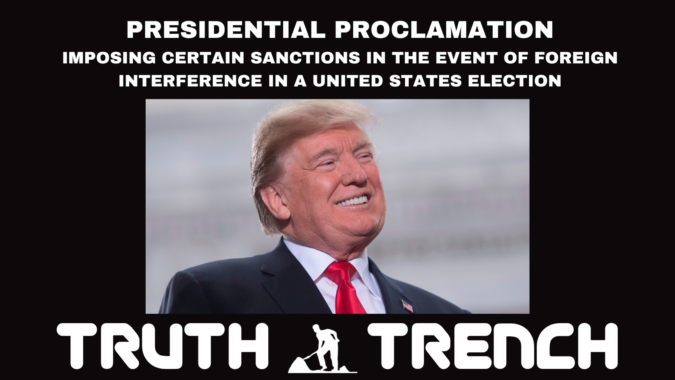This is the second of a nine part series of public Presidential proclamations that occurred during his first four years in office. Each of these documents has been sourced via the Federal Register, which is part of Truth Trench Resources.
These documents tell a story of the character of President Trump. Each document has its own intention. U.S. presidents make proclamations as a way to officially and publicly declare specific observances, events, or issues of national significance. These proclamations serve several important purposes.
- Raising Awareness: Proclamations help raise awareness about various issues, events, or causes. By officially recognizing these matters, the president can draw the public’s attention to them.
- Promoting Causes: Presidents use proclamations to promote various causes and initiatives. For instance, a president may issue a proclamation in support of National Breast Cancer Awareness Month, highlighting the importance of early detection and research.
- Supporting Policies: Proclamations may also be employed to support specific policy initiatives or to signal the president’s commitment to addressing particular issues.
- Celebrating Achievements: Proclamations are often used to celebrate achievements, milestones, or historical events. For example, a president may issue a proclamation to mark an anniversary of a significant historical event.
- Honoring Individuals or Groups: Proclamations can be a means of honoring individuals, groups, or organizations for their contributions or achievements. This recognition can have a significant impact and serve as an inspiration to others.
- Preserving Historical and Cultural Heritage: Some proclamations are aimed at preserving historical and cultural heritage, such as designating National Historic Landmarks or commemorating cultural heritage months.
- Expressing Sympathy or Condolences: Proclamations can also be used to express sympathy or condolences in the event of national tragedies, disasters, or the passing of prominent individuals.
Proclamations are a way for the president to work through the “bully pulpit” to communicate with the American people and highlight issues and events of national importance. They can serve as a means of providing recognition, promoting unity, and encouraging civic engagement. They are significant pieces of interest for understanding the motives of a President.
Public Presidential proclamations made by Donald J. Trump, during his first four years in office, may hold the key to better understanding his motives and his vision for America.
Originally posted to the Federal Register: https://www.federalregister.gov/documents/2018/09/14/2018-20203/imposing-certain-sanctions-in-the-event-of-foreign-interference-in-a-united-states-election
EXECUTIVE ORDER
13848
IMPOSING CERTAIN SANCTIONS IN THE EVENT OF FOREIGN
INTERFERENCE IN A UNITED STATES ELECTION
By the authority vested in me as President by the
Constitution and the laws of the United States of America,
including the International Emergency Economic Powers Act
(50 U.S.C. 1701 et seq.) (IEEPA), the National Emergencies
Act (50 U.S.C. 1601 et seq.) (NEA), section 212(f) of the
Immigration and Nationality Act of 1952 (8 U.S.C. 1182(f)),
and section 301 of title 3, United States Code,
I, DONALD J. TRUMP, President of the United States of
America, find that the ability of persons located, in whole or
in substantial part, outside the United States to interfere in
or undermine public confidence in United States elections,
including through the unauthorized accessing of election and
campaign infrastructure or the covert distribution of propaganda
and disinformation, constitutes an unusual and extraordinary
threat to the national security and foreign policy of the
United States. Although there has been no evidence of a
foreign power altering the outcome or vote tabulation in any
United States election, foreign powers have historically sought
to exploit America’s free and open political system. In recent
years, the proliferation of digital devices and internet-based
communications has created significant vulnerabilities and
magnified the scope and intensity of the threat of foreign
interference, as illustrated in the 2017 Intelligence Community
Assessment. I hereby declare a national emergency to deal with
this threat.
Accordingly, I hereby order:
This document is scheduled to be published in the
Federal Register on 09/14/2018 and available online at
https://federalregister.gov/d/2018-20203, and on govinfo.gov
2
Section 1. (a) Not later than 45 days after the
conclusion of a United States election, the Director of National
Intelligence, in consultation with the heads of any other
appropriate executive departments and agencies (agencies),
shall conduct an assessment of any information indicating that
a foreign government, or any person acting as an agent of or
on behalf of a foreign government, has acted with the intent or
purpose of interfering in that election. The assessment shall
identify, to the maximum extent ascertainable, the nature of any
foreign interference and any methods employed to execute it, the
persons involved, and the foreign government or governments that
authorized, directed, sponsored, or supported it. The Director
of National Intelligence shall deliver this assessment and
appropriate supporting information to the President, the
Secretary of State, the Secretary of the Treasury, the Secretary
of Defense, the Attorney General, and the Secretary of Homeland
Security.
(b) Within 45 days of receiving the assessment and
information described in section 1(a) of this order, the
Attorney General and the Secretary of Homeland Security, in
consultation with the heads of any other appropriate agencies
and, as appropriate, State and local officials, shall deliver to
the President, the Secretary of State, the Secretary of the
Treasury, and the Secretary of Defense a report evaluating, with
respect to the United States election that is the subject of the
assessment described in section 1(a):
(i) the extent to which any foreign interference
that targeted election infrastructure materially
affected the security or integrity of that
infrastructure, the tabulation of votes, or the
timely transmission of election results; and
3
(ii) if any foreign interference involved activities
targeting the infrastructure of, or pertaining to,
a political organization, campaign, or candidate, the
extent to which such activities materially affected
the security or integrity of that infrastructure,
including by unauthorized access to, disclosure or
threatened disclosure of, or alteration or
falsification of, information or data.
The report shall identify any material issues of fact with
respect to these matters that the Attorney General and the
Secretary of Homeland Security are unable to evaluate or reach
agreement on at the time the report is submitted. The report
shall also include updates and recommendations, when
appropriate, regarding remedial actions to be taken by the
United States Government, other than the sanctions described
in sections 2 and 3 of this order.
(c) Heads of all relevant agencies shall transmit to the
Director of National Intelligence any information relevant to
the execution of the Director’s duties pursuant to this order,
as appropriate and consistent with applicable law. If relevant
information emerges after the submission of the report mandated
by section 1(a) of this order, the Director, in consultation
with the heads of any other appropriate agencies, shall amend
the report, as appropriate, and the Attorney General and the
Secretary of Homeland Security shall amend the report required
by section 1(b), as appropriate.
(d) Nothing in this order shall prevent the head of any
agency or any other appropriate official from tendering to the
President, at any time through an appropriate channel, any
analysis, information, assessment, or evaluation of foreign
interference in a United States election.
4
(e) If information indicating that foreign interference in
a State, tribal, or local election within the United States has
occurred is identified, it may be included, as appropriate, in
the assessment mandated by section 1(a) of this order or in the
report mandated by section 1(b) of this order, or submitted to
the President in an independent report.
(f) Not later than 30 days following the date of this
order, the Secretary of State, the Secretary of the Treasury,
the Attorney General, the Secretary of Homeland Security, and
the Director of National Intelligence shall develop a framework
for the process that will be used to carry out their respective
responsibilities pursuant to this order. The framework, which
may be classified in whole or in part, shall focus on ensuring
that agencies fulfill their responsibilities pursuant to this
order in a manner that maintains methodological consistency;
protects law enforcement or other sensitive information and
intelligence sources and methods; maintains an appropriate
separation between intelligence functions and policy and legal
judgments; ensures that efforts to protect electoral processes
and institutions are insulated from political bias; and respects
the principles of free speech and open debate.
Sec. 2. (a) All property and interests in property
that are in the United States, that hereafter come within
the United States, or that are or hereafter come within the
possession or control of any United States person of the
following persons are blocked and may not be transferred, paid,
exported, withdrawn, or otherwise dealt in: any foreign person
determined by the Secretary of the Treasury, in consultation
with the Secretary of State, the Attorney General, and the
Secretary of Homeland Security:
5
(i) to have directly or indirectly engaged in,
sponsored, concealed, or otherwise been complicit in
foreign interference in a United States election;
(ii) to have materially assisted, sponsored, or
provided financial, material, or technological support
for, or goods or services to or in support of, any
activity described in subsection (a)(i) of this
section or any person whose property and interests
in property are blocked pursuant to this order; or
(iii) to be owned or controlled by, or to have acted
or purported to act for or on behalf of, directly or
indirectly, any person whose property or interests in
property are blocked pursuant to this order.
(b) Executive Order 13694 of April 1, 2015, as amended by
Executive Order 13757 of December 28, 2016, remains in effect.
This order is not intended to, and does not, serve to limit
the Secretary of the Treasury’s discretion to exercise the
authorities provided in Executive Order 13694. Where
appropriate, the Secretary of the Treasury, in consultation with
the Attorney General and the Secretary of State, may exercise
the authorities described in Executive Order 13694 or other
authorities in conjunction with the Secretary of the Treasury’s
exercise of authorities provided in this order.
(c) The prohibitions in subsection (a) of this section
apply except to the extent provided by statutes, or in
regulations, orders, directives, or licenses that may be issued
pursuant to this order, and notwithstanding any contract entered
into or any license or permit granted prior to the date of
this order.
6
Sec. 3. Following the transmission of the assessment
mandated by section 1(a) and the report mandated by
section 1(b):
(a) the Secretary of the Treasury shall review the
assessment mandated by section 1(a) and the report mandated by
section 1(b), and, in consultation with the Secretary of State,
the Attorney General, and the Secretary of Homeland Security,
impose all appropriate sanctions pursuant to section 2(a)
of this order and any appropriate sanctions described in
section 2(b) of this order; and
(b) the Secretary of State and the Secretary of the
Treasury, in consultation with the heads of other appropriate
agencies, shall jointly prepare a recommendation for the
President as to whether additional sanctions against foreign
persons may be appropriate in response to the identified foreign
interference and in light of the evaluation in the report
mandated by section 1(b) of this order, including, as
appropriate and consistent with applicable law, proposed
sanctions with respect to the largest business entities licensed
or domiciled in a country whose government authorized, directed,
sponsored, or supported election interference, including at
least one entity from each of the following sectors: financial
services, defense, energy, technology, and transportation (or,
if inapplicable to that country’s largest business entities,
sectors of comparable strategic significance to that foreign
government). The recommendation shall include an assessment
of the effect of the recommended sanctions on the economic and
national security interests of the United States and its allies.
Any recommended sanctions shall be appropriately calibrated to
the scope of the foreign interference identified, and may
7
include one or more of the following with respect to each
targeted foreign person:
(i) blocking and prohibiting all transactions in
a person’s property and interests in property subject
to United States jurisdiction;
(ii) export license restrictions under any statute
or regulation that requires the prior review and
approval of the United States Government as a
condition for the export or re-export of goods
or services;
(iii) prohibitions on United States financial
institutions making loans or providing credit to
a person;
(iv) restrictions on transactions in foreign
exchange in which a person has any interest;
(v) prohibitions on transfers of credit or
payments between financial institutions, or by,
through, or to any financial institution, for the
benefit of a person;
(vi) prohibitions on United States persons
investing in or purchasing equity or debt of a person;
(vii) exclusion of a person’s alien corporate
officers from the United States;
(viii) imposition on a person’s alien principal
executive officers of any of the sanctions described
in this section; or
(ix) any other measures authorized by law.
Sec. 4. I hereby determine that the making of donations
of the type of articles specified in section 203(b)(2) of IEEPA
(50 U.S.C. 1702(b)(2)) by, to, or for the benefit of any person
whose property and interests in property are blocked pursuant to
8
this order would seriously impair my ability to deal with the
national emergency declared in this order, and I hereby prohibit
such donations as provided by section 2 of this order.
Sec. 5. The prohibitions in section 2 of this order
include the following:
(a) the making of any contribution or provision of funds,
goods, or services by, to, or for the benefit of any person
whose property and interests in property are blocked pursuant
to this order; and
(b) the receipt of any contribution or provision of funds,
goods, or services from any such person.
Sec. 6. I hereby find that the unrestricted immigrant
and nonimmigrant entry into the United States of aliens whose
property and interests in property are blocked pursuant
to this order would be detrimental to the interests of
the United States, and I hereby suspend entry into the
United States, as immigrants or nonimmigrants, of such
persons. Such persons shall be treated as persons covered
by section 1 of Proclamation 8693 of July 24, 2011 (Suspension
of Entry of Aliens Subject to United Nations Security Council
Travel Bans and International Emergency Economic Powers Act
Sanctions).
Sec. 7. (a) Any transaction that evades or avoids, has
the purpose of evading or avoiding, causes a violation of, or
attempts to violate any of the prohibitions set forth in this
order is prohibited.
(b) Any conspiracy formed to violate any of the
prohibitions set forth in this order is prohibited.
Sec. 8. For the purposes of this order:
(a) the term “person” means an individual or entity;
9
(b) the term “entity” means a partnership, association,
trust, joint venture, corporation, group, subgroup, or other
organization;
(c) the term “United States person” means any
United States citizen, permanent resident alien, entity
organized under the laws of the United States or any
jurisdiction within the United States (including foreign
branches), or any person (including a foreign person) in
the United States;
(d) the term “election infrastructure” means information
and communications technology and systems used by or on behalf
of the Federal Government or a State or local government in
managing the election process, including voter registration
databases, voting machines, voting tabulation equipment, and
equipment for the secure transmission of election results;
(e) the term “United States election” means any election
for Federal office held on, or after, the date of this order;
(f) the term “foreign interference,” with respect to
an election, includes any covert, fraudulent, deceptive, or
unlawful actions or attempted actions of a foreign government,
or of any person acting as an agent of or on behalf of a
foreign government, undertaken with the purpose or effect of
influencing, undermining confidence in, or altering the result
or reported result of, the election, or undermining public
confidence in election processes or institutions;
(g) the term “foreign government” means any national,
state, provincial, or other governing authority, any political
party, or any official of any governing authority or political
party, in each case of a country other than the United States;
(h) the term “covert,” with respect to an action or
attempted action, means characterized by an intent or apparent
10
intent that the role of a foreign government will not be
apparent or acknowledged publicly; and
(i) the term “State” means the several States or any
of the territories, dependencies, or possessions of the
United States.
Sec. 9. For those persons whose property and interests
in property are blocked pursuant to this order who might have
a constitutional presence in the United States, I find that
because of the ability to transfer funds or other assets
instantaneously, prior notice to such persons of measures to
be taken pursuant to this order would render those measures
ineffectual. I therefore determine that for these measures to
be effective in addressing the national emergency declared in
this order, there need be no prior notice of a listing or
determination made pursuant to section 2 of this order.
Sec. 10. Nothing in this order shall prohibit transactions
for the conduct of the official business of the United States
Government by employees, grantees, or contractors thereof.
Sec. 11. The Secretary of the Treasury, in consultation
with the Attorney General and the Secretary of State, is hereby
authorized to take such actions, including the promulgation of
rules and regulations, and to employ all powers granted to the
President by IEEPA as may be necessary to carry out the purposes
of this order. The Secretary of the Treasury may re-delegate
any of these functions to other officers within the Department
of the Treasury consistent with applicable law. All agencies
of the United States Government are hereby directed to take all
appropriate measures within their authority to carry out the
provisions of this order.
Sec. 12. The Secretary of the Treasury, in consultation
with the Attorney General and the Secretary of State, is hereby
11
authorized to submit the recurring and final reports to the
Congress on the national emergency declared in this order,
consistent with section 401(c) of the NEA (50 U.S.C. 1641(c))
and section 204(c) of IEEPA (50 U.S.C. 1703(c)).
Sec. 13. This order shall be implemented consistent with
50 U.S.C. 1702(b)(1) and (3).
Sec. 14. (a) Nothing in this order shall be construed to
impair or otherwise affect:
(i) the authority granted by law to an executive
department or agency, or the head thereof; or
(ii) the functions of the Director of the Office
of Management and Budget relating to budgetary,
administrative, or legislative proposals.
(b) This order shall be implemented consistent with
applicable law and subject to the availability of
appropriations.
(c) This order is not intended to, and does not, create
any right or benefit, substantive or procedural, enforceable at
law or in equity by any party against the United States, its
departments, agencies, or entities, its officers, employees, or
agents, or any other person.
THE WHITE HOUSE,
September 12, 2018.
[FR Doc. 2018-20203 Filed: 9/13/2018 11:15 am; Publication Date: 9/14/2018]

Do you enjoy what Truth Trench has to offer? SUBSCRIBE HERE













